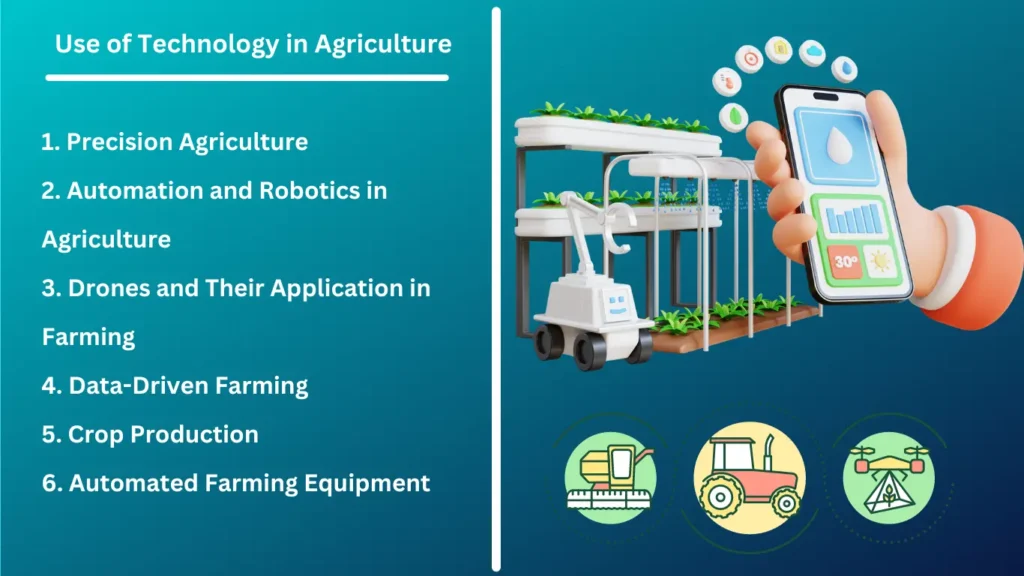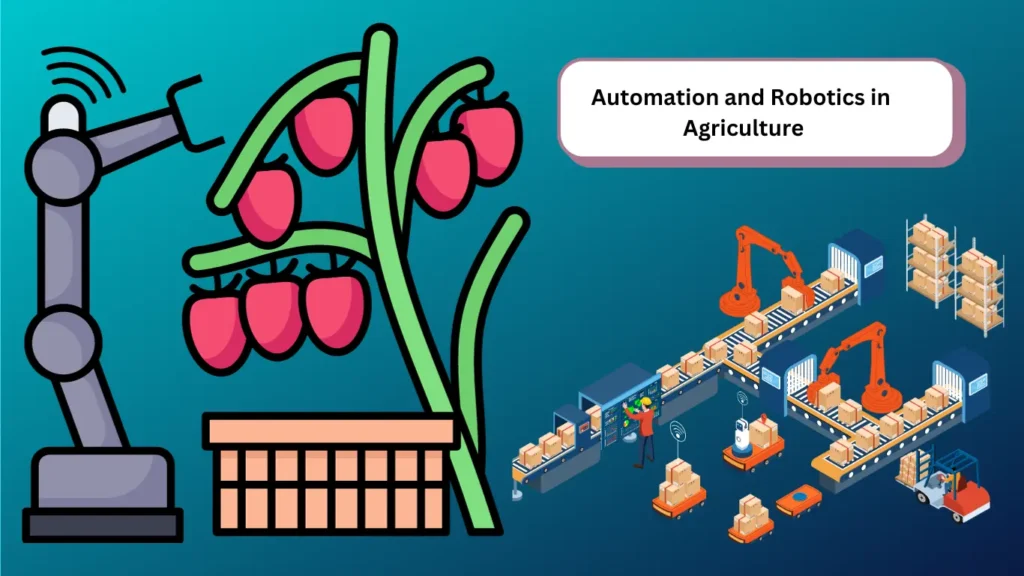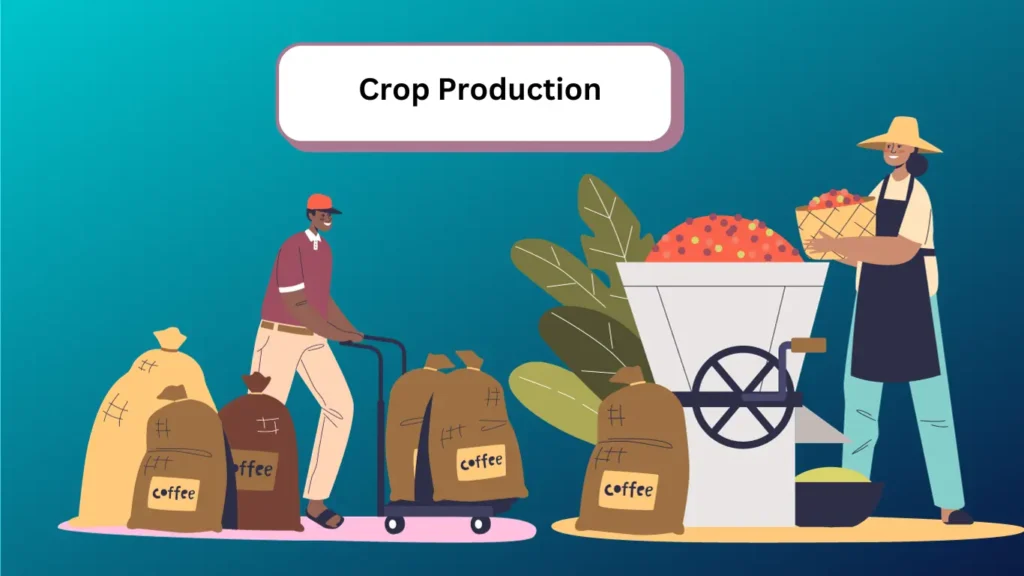Use of Technology in Agriculture: The integration of cutting-edge technologies has revolutionized traditional farming practices, leading to increased efficiency, sustainability, and productivity.

In this comprehensive article, we will explore the various facets of technology’s influence on modern agriculture, from precision farming to the role of drones and automation.
Use of Technology in Agriculture
1. Precision Agriculture
Precision agriculture, also known as precision farming, represents a paradigm shift in the way farmers approach crop cultivation. By leveraging advanced technologies such as GPS, sensors, and data analytics, precision agriculture enables farmers to tailor their practices to specific field conditions, thereby optimizing resource utilization and crop yields.
Through the precise application of fertilizers, pesticides, and irrigation, farmers can minimize waste and environmental impact while maximizing the productivity of their land. The combination of real-time data and targeted interventions has proven to be instrumental in mitigating risks and improving overall farm management.
2. Automation and Robotics in Agriculture
The integration of automation and robotics in agriculture has redefined the way tasks are performed on the farm. From planting and harvesting to weed control and crop monitoring, automated systems and robotic machinery have significantly optimized labor-intensive processes, leading to increased operational efficiency and cost-effectiveness.

As technology continues to advance, we can expect to see further innovation in the field of agricultural robotics, with the potential to revolutionize farming practices and drive sustainable growth in the industry. Additionally, the implementation of robotic systems has led to improved safety and reduced occupational hazards for farm workers.
3. Drones and Their Application in Farming
The use of drones in farming has emerged as a game-changing technology, offering farmers unprecedented capabilities in crop monitoring, field mapping, and pest management. Equipped with high-resolution cameras and multispectral sensors, drones can capture detailed aerial imagery of farmland, providing farmers with valuable insights into crop health, nutrient deficiencies, and irrigation needs.
The use of drones for crop spraying and pest control has demonstrated significant reductions in chemical usage and environmental impact, aligning with the principles of sustainable and eco-friendly farming practices.
Drones have proven to be instrumental in precision agriculture, enabling the creation of detailed 3D maps of fields and the identification of areas requiring specific interventions. The real-time data collected by drones allows for timely decision-making, leading to more effective resource utilization and improved overall farm management.
4. Data-Driven Farming
In the era of modern farming, data has become a critical asset for informed decision-making and strategic planning. Data-driven farming involves the collection, analysis, and utilization of agricultural data to optimize operational efficiency, improve crop yields, and enhance sustainability.
By leveraging technologies such as IoT (Internet of Things) devices, sensors, and cloud-based platforms, farmers can gather real-time data on weather patterns, soil conditions, and crop performance, allowing for proactive adjustments and precise interventions.
Through the analysis of historical data and predictive modeling, farmers can anticipate trends, mitigate risks, and optimize resource allocation, ultimately leading to improved operational performance and sustainable agricultural practices.
5. Crop Production
The impact of technology on crop production has been profound, ushering in a new era of precision, sustainability, and resilience. Advanced technologies such as biotechnology, genetic engineering, and precision breeding have enabled the development of high-yielding, disease-resistant crop varieties that thrive in diverse environmental conditions.

The integration of smart farming solutions, including automated irrigation systems, climate-controlled environments, and precision nutrient management, has optimized the conditions for crop growth, leading to higher yields and improved quality.
As technology continues to evolve, the impact on crop production will undoubtedly continue to shape the agricultural landscape, driving sustainable growth and resilience in the face of environmental challenges.
6. Automated Farming Equipment
Automated machinery, such as autonomous tractors, robotic harvesters, and self-propelled sprayers, has revolutionized tasks such as planting, harvesting, and crop maintenance, enabling farmers to streamline their operations and optimize resource utilization.
The use of automated farming equipment has translated into improved safety and reduced occupational hazards for farm workers, as labor-intensive tasks are now performed by sophisticated machinery. The integration of advanced technologies, including GPS guidance systems, telematics, and remote monitoring, has enabled farmers to achieve higher levels of operational control and visibility, leading to more informed decision-making and proactive maintenance.
As the agricultural industry continues to embrace automation, the advantages of automated farming equipment will play a pivotal role in shaping the future of farming, driving sustainable growth and resilience in the face of evolving challenges.
Conclusion: Use of Technology in Agriculture
In conclusion, the impact of technology on modern farming is undeniable, reshaping traditional practices and driving sustainable growth in the agricultural industry. From precision agriculture and automation to the pivotal role of drones and data-driven farming, the integration of advanced technologies has revolutionized crop production, resource utilization, and farm management.
As we look to the future, the continued evolution of technology in farming holds vast potential for addressing global food security, environmental sustainability, and economic resilience. By embracing innovation and leveraging the power of technology, the agriculture sector is poised to thrive in the face of evolving challenges, ensuring a sustainable and prosperous future for generations to come.